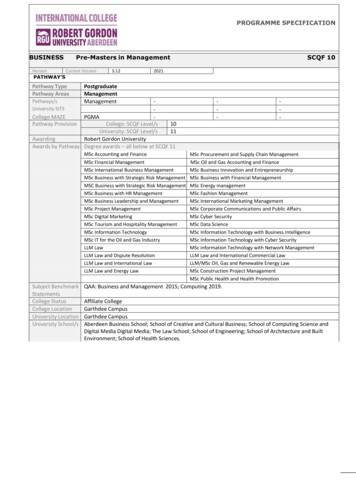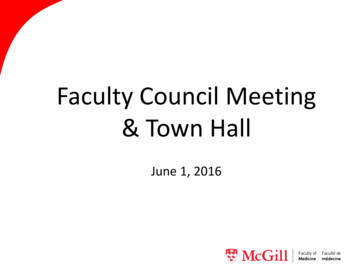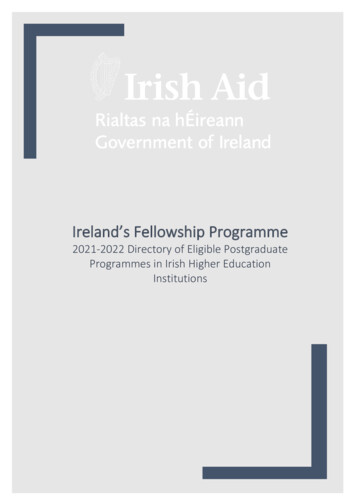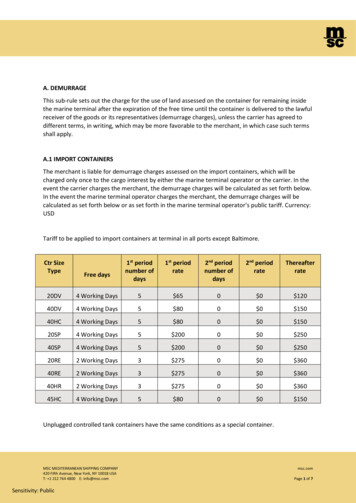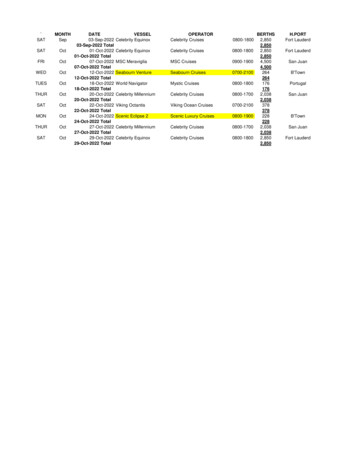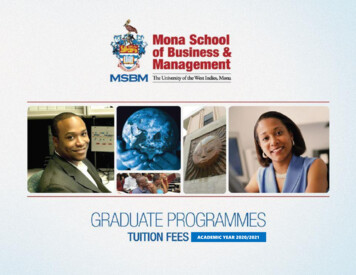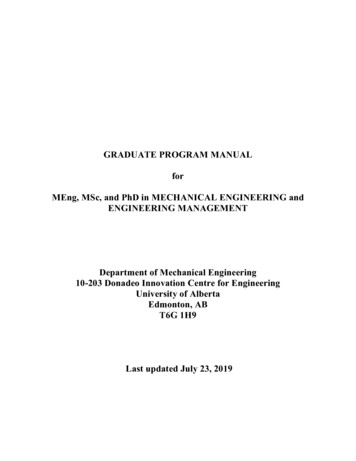
Transcription
GRADUATE PROGRAM MANUALforMEng, MSc, and PhD in MECHANICAL ENGINEERING andENGINEERING MANAGEMENTDepartment of Mechanical Engineering10-203 Donadeo Innovation Centre for EngineeringUniversity of AlbertaEdmonton, ABT6G 1H9Last updated July 23, 2019
0. Preamble0.1 The purpose of this manual is to provide graduate students, staff and faculty members with astatement of the rules and policies for graduate study in the Department of MechanicalEngineering (“the Department”). It is most relevant to graduate students pursuing any of anMEng, MSc or PhD in either of Mechanical Engineering or Engineering Management.0.2 The information contained herein is meant to supplement the University of Alberta Calendar,which is the primary document describing course and program requirements. This manual isconcerned with program, course and examination requirements that are specific to theDepartment. The Department’s rules, policies and timelines for admission and promotion may bemore stringent than those of the Faculty of Graduate Studies and Research (“FGSR”) and arefully described below. On the other hand, none of the material below is meant to contravene therules and policies of FGSR or the University as stated in the Calendar. In the event of adiscrepancy, the Calendar shall be considered the authoritative document.0.3 All graduate students within the Department require either a thesis (MSc, PhD) or capstoneproject (MEng) supervisor. Given the particular importance of the graduate student/supervisorrelationship, some guidelines for the conduct of supervisors and graduate students are alsoincluded below. Graduate students experiencing difficulty in the administration of their programare encouraged to consult with the Associate Chair Graduate (“ACGrad”). Early resolution ofconflicts or misunderstandings is clearly beneficial to all involved. Other sources of assistanceare also briefly outlined.0.4 Also included in this document are guidelines for the duties of MSc/PhD teaching assistants(“TAs”) and instructors. These guidelines are included to help both faculty members andstudents understand their respective pedagogical roles. Of course, the range of possible TAassignments is broad and therefore a TA who is assigned to a particular course should consultwith the instructor of that course as soon as possible to clarify the expected duties andresponsibilities.0.5 In this manual, information that pertains specifically to the Engineering Managementprogram shall appear in red. Information that pertains specifically to the Mechanical Engineeringprogram shall appear in blue.0.6 [EngM] The Engineering Management program at the University of Alberta offers a flexibleprogram that allows a graduate engineer to broaden their knowledge of management-relatedtopics. The program can be individually adapted to include a significant number of technicalcourses as well. The emphasis in the program is on a core course offering a foundation inengineering management, and a flexible selection of additional courses to meet the needs of eachindividual in the program. The Engineering Management program is open to students from allengineering disciplines. For administrative purposes, the program is housed in the Department ofMechanical Engineering, but it is not limited to students with a mechanical engineeringbackground. Although the ACGrad is the ultimate authority for the program, faculty colleagueswhose research/teaching includes topics related to engineering management may provideassistance and advice. Indeed, and from time to time, the ACGrad may delegate responsibility2
for administration of the Engineering Management program (admission, course approvals, etc.)to one of these faculty colleagues.0.7 Graduate students requiring additional information over and above what is presented beloware encouraged to read/consult The FGSR Graduate Program Manual,The International Centre,The Centre for Teaching and Learning (CTL),The Collective Agreement of the Graduate Students’ Association (“GSA”),The Graduate Student Ombudperson, and/orThe Copyright Office.3
1. ADMISSION, PROMOTION, PROBATION AND LENGTH OF PROGRAM1.1Admission1.1.1 All applicants are expected to hold or shortly receive a Bachelor’s Degree in engineering(or a closely aligned field) from a recognized university. The minimum Grade Point Average(“GPA”) required for admission to the MEng program is 3.5/4. The minimum GPA required foradmission to either of the MSc or PhD programs is 3.0/4. Under exceptional circumstances (e.g.a significant record of high-impact work in industry), applicants with below-minimum GPAsmay be considered, however, such cases are expected to be rare. Subject to the approval of theACGrad and FGSR, MSc and PhD applicants might also be admitted to the Department on aqualifying or probationary basis e.g. when they can demonstrate the potential to perform at ahigh-level notwithstanding inferior academic performance from the past. Any students admittedon a qualifying or probationary basis but who fail to meet their admission conditions may beassigned additional coursework by the ACGrad, placed on academic probation or required towithdrawal.1.1.2 In general, a thesis-based Master's degree is required for admission to the PhD program.Under exceptional circumstances, admission without a Master's degree may be considered,particularly for scholarship-level students. Students who intend to pursue doctoral studies andhave a Bachelor’s degree will normally be enrolled in the MSc program. After one year in theMSc program, a student may be allowed to transfer to the PhD program. This decision is notautomatic and requires above-average performance plus a strong recommendation from thestudent's supervisor/supervisory committee and the ACGrad. Admission to the PhD programafter a Master's degree is obtained only by application.1.1.3 International applicants for whom the language of instruction of previous degree(s) was notEnglish must also complete either of the TOEFL or IELTS tests. The Department’s minimumTOEFL score is 93 and the minimum IELTS score is 6.5. In exceptional cases, an M.Sc. or Ph.D.applicant with a marginally inferior score may be considered, but only if the applicant'sprospective research supervisor is willing to attest, in writing, that an independent and positiveassessment of English-language communication skills has been made. Such an assessmentshould derive from an in-person or telephone interview (to assess speaking and listening skills),from a reevaluation of the applicant's statement of purpose (to assess writing skills) and/or froma reading comprehension exercise involving a discipline-appropriate journal article or bookchapter (to assess reading and writing skills). The onus is on the applicant to request his/herprospective research supervisor to make such an assessment, which may be denied or may, evenif conducted and included, prove insufficient depending on other strengths and weaknesses of theentire application dossier.1.1.4 Admission to either of the MSc or PhD programs does not guarantee that financial supportwill be available. (Department-based support is not offered to MEng students.)4
1.2Promotion1.2.1 To continue in the graduate program, the minimum cumulative GPA on graduate-levelcourses is 3.0 for MEng and MSc students and 3.3 for PhD students. The cumulative GPA isevaluated at the end of each academic term. Students falling below this minimum will be placedon academic probation in the following term, during which they must raise their cumulative GPAabove the appropriate minimum level.1.2.2 Regardless of degree program, the passing grade for graduate students registered is C .1.3Academic Probation1.3.1 A student who has been placed on academic probation must, by the end of the probationaryterm, satisfy the academic probationary conditions defined by the ACGrad and approved byFGSR. If the student fails to meet the requisite conditions, the ACGrad may recommend toFGSR whether the student’s program should be changed (e.g. MSc to MEng). Alternatively, theACGrad may recommend to FGSR that the student be required to withdraw. A PhD student whoenters into academic probation after the first semester, must typically meet the minimumcumulative GPA by taking three graduate courses with the weights of 3 units each (not includingTHES 90X). The courses in question should be decided upon consultation with the ACGrad.1.3.2 Note, finally, that students who fall into academic probation, whether due to poor academicperformance or poor research performance, may have their RA stipends reduced or terminated.1.4Length of Program1.4.1 FGSR has established the following time limits for degree completion, measured from thetime of admission: PhD – six years MSc – four years MEng – six yearsThe extended time limit in case of the MEng program is to accommodate the high number ofpart-time students. In the special case of a Master's student who is reclassified as a PhD student,all degree requirements must be fulfilled within 6 years from when they first registered in theMaster's program.1.4.2 Program extensions may be granted, based on an application by the student to FGSR, withwritten justification. Note, however, that an extension is not guaranteed. It is the responsibility ofthe student to request any program extension.1.4.3 Note, finally, that MSc and PhD financial support in the form of TAs or ResearchAssistantships (RAs) is not guaranteed for the duration of one’s graduate program.5
2.REGISTRATION PROCEDURES2.1 Within 1 month of beginning their programs, all MSc and PhD students must meet with theirsupervisor(s) and complete the “First Meeting” paperwork, which is designed to make newstudents aware of responsibilities, regulations and expectations. Students enrolled in the MEngprogram (or MSc and PhD students lacking a supervisor upon entry) should instead meet withthe ACGrad or his/her designate. MSc and PhD students are strongly encouraged to contact theirsupervisor(s) in advance of such a meeting to discuss graduate course selection. In this respect,note that not all graduate courses listed in the University Calendar are offered every year. It is theresponsibility of each student to ensure that his/her program satisfies the expectations of his/hersupervisor(s) and the requirements of FGSR and the Department. Note, in particular, that anystudents receiving financial support from the Department are expected to maintain full-timeregistration status.2.2 Students who experience difficulty in a course are encouraged to discuss their concerns withthe instructor, the ACGrad and/or their supervisor(s). Withdrawing from a course requires thecompletion of a course withdrawal form, which must be reviewed and approved by the ACGrad.3.APPOINTMENT OF SUPERVISOR3.1 All full-time MSc and PhD students should secure a supervisor (or supervisors) within theirfirst four and eight months of study, respectively. Part-time students need only identify asupervisor or supervisors when they are due to commence their thesis-based research. Finally,MEng students are encouraged to select a supervisor (and capstone project) once theircoursework is substantially complete. The supervisor of the capstone project does not serve as asupervisor of the overall academic program for the student. This role is filled by the ACGrad orhis/her designate. Regardless of program type and unless permission is obtained from theACGrad, at least one of the supervisors should reside in the Department.3.2 It is the responsibility of the supervisor or supervisors to notify the Graduate ProgramAssistant once a supervisory arrangement has been made so that the appropriate FGSR formsmay be completed. Students are encouraged to verify that such paperwork has been completed. Ifa supervisor has not been officially appointed to a full-time MSc or PhD student by theappropriate time, the student in question will be required to meet with the ACGrad. If asupervisor cannot be found within the Department, the ACGrad may recommend a change ofdegree program and/or a termination of applicable funding.3.3 A complete supervisory committee must be established for PhD students within their firstyear in the program.4.DEGREE REQUIREMENTS4.1Course Requirements4.1.1 A "graduate course" is one that is listed in the graduate section of the University Calendar.The Department offers a limited number of introductory graduate courses (MEC E 5XX, ENG M6
5XX) as well as specialized graduate courses at the 600- (MEC E and ENG M) and 700- (MECE) levels. The ACGrad should be consulted before registering in any course not specificallylisted as a graduate course. Courses at or below the 400-level are typically not recognized forcredit in graduate programs. Course substitution (i.e., to receive credit from a normally ineligiblecourse) or program modification requires the prior written approval of the ACGrad.4.1.2 MEng Program Students must complete a minimum of nine three-credit courses or equivalent, i.e. 27 creditsof course work. They must also complete ENGG 600, ENGG 601, ENGG 602 and a capstoneproject (MEC E 910) approximately equivalent to three credits. To avoid the payment ofadditional fees, students are encouraged to enroll in MEC E 910 only in the academic term inwhich they plan to formally submit their capstone project.The ACGrad and/or project supervisor can, upon review of the student’s transcripts,experience and performance, require additional courses in excess of the 27 credit minimum.These additional requirements can include courses at the undergraduate or graduate level.A maximum of three courses can be taken in any combination from MEC E 5XX and MEC E7XX.[MecE] At least five of the courses must be MEC E courses.[EngM] At least five of the courses must be ENG M courses.No reading courses can be credited towards the degree requirements.Students wishing to enroll in any course that is part of the MBA program offered through theSchool of Business must apply to do so through the ACGrad.A capstone project approximately equivalent to one three-credit course is required for theMEng degree. Students are responsible for securing a capstone supervisor and should do sobased on common research interests. Working with this supervisor, a capstone topic must beidentified. The ACGrad may be consulted for assistance in identifying an appropriatecapstone supervisor.4.1.3 [MecE] MBA/MEng - Joint ProgramThe Faculty of Business and the Faculty of Engineering offer a program of joint study, whichenables students to earn both the Master of Business Administration (MBA) and MEng degreesafter two calendar years of full-time study.The requirements for the MBA/MEng joint degree are laid out in the University Calendar section205.9.5. In brief, students are required to take a minimum of five three-credit graduate courses inEngineering (excluding ENG M courses). Of these, at least three must be MEC E courses; theremaining two courses must be acceptable to the Department. At most two of the five coursescan be 500-level MEC E courses. No reading courses may be credited towards the minimumcourse requirements for the MEng program. Students are required to complete a capstone projectas summarized above.7
4.1.4 MSc program Students must complete a minimum of five three-credit courses, i.e. 15 credits of coursework. They must also complete ENGG 600, ENGG 601, ENGG 602 then complete andorally defend a thesis deemed acceptable to the Department and FGSR.The ACGrad and/or thesis supervisor(s) can, upon review of the student’s transcripts,experience and performance, require additional courses in excess of the 15 credit minimum.These additional requirements can include courses at the undergraduate or graduate level.[MecE] At least three of the courses must be MEC E courses. Either a maximum of one MECE 700-level course and one MEC E 500-level course, or two MEC E 700-level (and no MECE 500-level) courses can be credited. Finally, one of the courses must be a “foundational”course selected from the following list: MEC E 614, 630, 639, 651, 653, 663, 671, 673, 680,681, 683, 690, 692.[EngM] At least three of the courses must be ENG M courses.No reading courses can be credited towards the degree requirements.Students wishing to enroll in any course that is part of the MBA program offered through theSchool of Business must apply to do so through the ACGrad.4.1.5 PhD Program 8Students already holding an MSc must complete a minimum of four three-credit courses, i.e.12 credits of course work.Students who do not hold an MSc must normally complete a minimum of nine three-creditcourses, i.e. 27 credits of course work. In exceptional cases, i.e. with the written support ofthe supervisory committee and where the student’s cumulative GPA exceeds 3.5, he/she maypetition the ACGrad to reduce this course load requirement from nine to seven. Anyreduction of course load must still take into account the regulations outlined below, e.g. PhDstudents specializing in mechanical engineering are never exempt from having to completeMEC E 680.Students must also complete ENGG 600, ENGG 601, ENGG 602 then complete and orallydefend a thesis deemed acceptable to the Department and FGSR. (As described below,completion of a PhD thesis also requires successful completion of a candidacy exam.)The ACGrad, thesis supervisor(s), supervisory committee and/or candidacy exam committeecan, upon review of the student’s transcripts, experience and performance, require additionalcourses in excess of the minimums specified above. These additional requirements caninclude courses at the undergraduate or graduate level.[MecE] At least three courses must be MEC E courses.[MecE] One course must be MEC E 680.[MecE] For students already holding an MSc, a maximum of one MEC E course can becredited at the 700-level; no MEC E courses at the 500-level can be credited. For studentswho do not hold an MSc, the following restrictions apply: (i) a maximum of two 700-levelMEC E courses plus one 500-level MEC E course, or, (ii) three 700-level MEC E coursesand no 500-level MEC E courses.[EngM] At least two of the courses must be ENG M courses.No reading courses can be credited towards the degree requirements.
Students wishing to enroll in any course that is part of the MBA program offered through theSchool of Business must apply to do so through the ACGrad.4.1.6 All of the programs described above require the successful completion of ENGG 600,ENGG 601 and ENGG 602. Students are encouraged to complete the former two classes as earlyas possible within their program of study.4.2Full-Time vs. Part-Time Enrolment4.2.1 Students who are admitted to any thesis-based program and who initially register full-timemust maintain full-time registration for the duration of their program. Students with full-timestatus will have increased access to scholarships, bursaries, student loans, and travel funds.4.2.2 The University defines "full-time" as enrolment with a total of 9 credits of course weight.A typical course has a weight of 3 credits. Any total number of credits less than 9 units per termdefines the student as "part-time". See the sub-section “THES 90X Courses” below forinformation on using THES 90X courses to maintain full-time enrolment.4.2.3 Part-time registration is usually reserved for students who cannot spend the majority oftheir time on thesis research due to job commitments or some other exceptional circumstances.The students in question are usually ineligible to receive TA and RA funding. Any studentwishing to enroll as a part-time student must inform his/her supervisors and the ACGrad prior tobeginning his/her graduate program.4.3Residency Requirement4.3.1 The MEng has no residency requirement. The MSc requires two academic terms of fulltime attendance at the University. The PhD requires [EngM] one and [MecE] two academicyears of full-time attendance, respectively, for degrees in Engineering Management andMechanical Engineering.4.4Continuous Enrolment4.4.1 All students, whether full-time or part-time, are required to register at least once in anyacademic year i.e. September - August period. Students in thesis-based programs, whether fulltime or part-time, must register in a course each term, THES 90X or otherwise. Failure toregister in any academic year will be interpreted by FGSR as a withdrawal from the program; thestudent will then have to apply for re-admission and pay an FGSR readmission fee. FGSR has acontinuous registration fee that will allow registered students to maintain their academicprivileges when not taking any other courses.4.5THES 90X Courses4.5.1 Students in thesis-based programs will often take fewer than three courses per term but willbe required to maintain full-time registration status. Such students should register in THES 90Xwhere X 3, 4, 5 . 9 is the weighting unit. For example, THES 909 carries a credit weight of9
nine and should be selected when the student is not enrolled in any courses for the academic termin question. Note also that FGSR requires a minimum quantum of THES 90X registration. Forinstance, the MSc program requires a minimum enrolment of 24 credits in course and THES 90Xweight. Hence, an MSc student taking six three-credit courses would require six credits ofTHES 90X registration. Note finally that students must be registered in THES 90X for the termin which they submit their thesis.4.5.2 MEng students cannot register in THES 90X. Any MEng student taking fewer than threecourses per term (Fall and Winter semesters) is therefore classified as part-time.4.6Transfer and Advanced Credit4.6.1 Requests for transfer and/or advanced credit must be approved by FGSR. For thesis-basedand course-based programs, respectively a maximum of two and three courses can be applied.Recall, however, that the student may be required to take more than the minimum number ofcourses as outlined above.5EXAMINATION REQUIREMENTS5.1MEng Program5.1.1 Completion of the capstone project requires submission of a capstone report. Guidelines onreport preparation are available from the Faculty of Engineering (i.e. see the document titled“Faculty of Engineering Master’s of Engineering Capstone or Project Report Guidelines”). Tworeaders, including the capstone supervisor, must approve the MEng project report (typically bysigning a report completion form). There is no oral defense. One copy of the project reportsigned by the two readers must be provided to the Graduate Program Assistant prior tograduation for retention by the Department.5.2MSc Program5.2.1 An oral defense of the thesis is a program requirement. The purpose of the oral defense isto ensure that the thesis research is of high quality, that the student carried out the work, that thestudent understands and can interpret the results and that the thesis is written in a clear andconcise manner. The procedure followed for the MSc oral defense is outlined in Appendix A.5.3PhD Program5.3.1 PhD students must pass an oral candidacy examination and an oral thesis defense. Themain features of these exams are as follows: For full-time students, the candidacy exam will normally be scheduled between 18 and 24months (but no more than 24 months) after the student begins his/her program of study.(For part-time students, the candidacy exam must be completed within the first 36 months.)The exam should occur after the course work is substantially complete and some progress10
has been made on the topic of research. The purpose of the candidacy exam is to ensurethat the student has adequate preparation to proceed with the thesis research. The purpose of the oral defense is to ensure that the thesis research is of high quality, thatthe student carried out the work, that the student understands and can interpret the resultsand that the thesis is written in a clear and concise manner.Further information on the candidacy exam and thesis defense can be found in Appendix B andC, respectively.6OTHER REQUIREMENTS6.1Formal First Meeting with Supervisor6.1.1 For MSc and PhD students admitted for September 2016 and onwards, FGSR requiresformal documentation of the first meeting between a student and his/her supervisor(s). Thepurpose of this meeting is to discuss “program requirements, academic integrity requirements,the role of the supervisor, the preferred means of communication, the availability or nonavailability of funding, and scholarly practices and outputs.” A copy of the signed documentmust be provided to the Graduate Program Assistant within 1 month of the start of the student’sprogram.6.2Academic Integrity and Ethics Training6.2.1 Ethics and academic integrity training is mandatory for gradute students. As such, studentsare required to successfully complete a University-wide WebCT course and ENGG 600. Furtherinformation is as follows:1. University-wide WebCT course (GET or Graduate Ethics Training) -This online course covers various topics, including conflict of interest, graduatestudent-faculty relationships, intellectual property and credit, conflict resolution, andintegrity and scholarship. Students will receive certification of five credit hours uponsuccessful completion.2. ENGG 600 – Engineering Ethics and IntegrityThis course carries 0.5 credit weight; registration is through BearTracks. Inexceptional circumstances, e.g. full-time employment outside of the Edmonton area, astudent may have difficulty attending the lectures of ENGG 600 if given on a weeklybasis. The ACGrad must approve special arrangements in this case.6.2.2 MSc students must complete the above requirements before thesis submission; PhDstudents must complete these requirements within the first 36 months of their program andpreferably before the candidacy exam.6.3Professional DevelopmentFGSR and the Faculty of Engineering recognize the importance of professional development(PD) as one part of a multifaceted approach to preparing graduate students for their future11
successful careers. Students should refer to uab.ca/enggpd and the FGSR professionaldevelopment website for more information on mandatory PD requirements and the associatedtimelines for completion.6.4TA Orientation Classes6.4.1 All MSc and PhD students accepting a Departmental TA must first complete a Departmentapproved TA Orientation session. This training is typically included in the Department’s NewGraduate Student Orientation session held in the first week of the Fall and Winter semesters.Failure to attend the orientation will result in the cancellation of TA assignment(s). In addition,students are encouraged to attend some of the training seminars offered regularly on campus.These include seminars offered by the Center for Teaching and Learning(http://www.ctl.ualberta.ca) or FGSR, which regularly hosts a “Teaching Development Week”(see http://www.gradstudies.ualberta.ca/).7GUIDELINES FOR THESIS SUPERVISORS AND MSc AND PhD STUDENTS7.1Supervisors7.1.1 A supervisor’s primary tasks are to provide supervision of the overall academic programand to provide an environment for the student that is conducive to research and in which thestudent can grow intellectually. This includes the following:(a) Provide appropriate guidance to the student on the nature of research and the standardexpected, and be accessible to give advice and constructive criticism. At the beginningof the supervisory relationship, the student should be made aware of the normalexpectations held by the supervisor and the department.(b) With the student, establish a realistic timetable for completion of various phases of theprogram.(c) Consider a graduate student as a "junior colleague in research".(d) Ensure that there are sufficient material and supervisory resources for each graduatestudent under supervision.(e) For doctoral students, work with the student to establish the supervisory committeewithin 1 year after the start of the program and ensure that it maintains contact andformally meets with the student at least once per year.(f) When going on leave or an extended period of absence, ensure that the student isadequately supervised by the provision of an acting supervisor (who should be amember of the supervisory committee).(g) Ensure that the student is aware of his/her guidelines (as listed below) and, whennecessary, assist the student in meeting these.12
(h) Set up committee meetings and examinations after consultation and with fullknowledge of the student. Students must be given sufficient advance knowledge of oralexaminations.(i) In case of PhD students preparing for their final defense, provide suitablerecommendations to the ACGrad for the selection of an External examiner (seeAppendix C for additional information).7.2Graduate Students7.2.1 All graduate students should make themselves aware of the contents of the graduateportions of the University Calendar. Graduate students take full responsibility for their ownprograms (course and program requirements, meeting program milestones, etc.) In addition:a) All thesis-based graduate students must meet with their supervisory committee at leastonce per year. One of these meetings will be designated by the supervisory committee asthe ‘main meeting.’ Immediately following such a ‘main meeting,’ a brief reportsummarizing the contents of the meeting and the progress of the student should besubmitted to the Graduate Program Assistant. At least one ‘main meeting’ must be heldbefore the candidacy exam.b) All graduate students must maintain open communication with their supervisor andACGrad concerning any problem either real or perceived.c) All graduate students must maintain regular meetings with the supervisor and ensure thatthe supervisor is kept regularly appraised of all progress made and/or any concerns withthe program.d) All graduate students should strive to make research results accessible (beyond theirreproduction in a thesis) to an appropriate audience.e) All graduate students should rem
Graduate students experiencing difficulty in the administration of their program are encouraged to consult with the Associate Chair Graduate ("ACGrad"). Early resolution of . Mechanical Engineering, but it is not limited to students with a mechanical engineering background. Although the ACGrad is the ultimate authority for the program .



